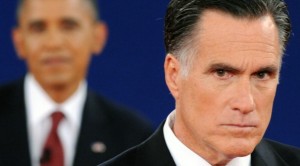Fact-Checking Obama and Romney on Energy and the Environment

Photo by Spencer Platt/Getty Images
The candidates sparred over energy and the economy at last night's debate, and fact-checkers have been busy looking into their claims.
Last night’s presidential debate saw a lot of claims and assertions about energy and environmental policy, so we sat down to sift through what the candidates are saying. It may not surprise you that there were some questionable assertions from both sides.
It’s worth noting that any policy, and energy policy in particular, doesn’t typically boil down into easy sound bites or attacks like the ones being used by both campaigns. The factors are often complex and nuanced. Take gasoline prices, for instance: the White House has little control over whether prices go up, and becoming “energy independent” isn’t likely to do much to bring them down. Oil is traded on a world market, so what happens in the Strait of Hormuz is likely to have an impact at the pump in Des Moines.
Using various fact-checks by PolitiFact, FactCheck, and the New York Times, here’s a list of some of the truths, untruths and half-truths delivered in last night’s debate:
- Half-True/Half-False: Drilling on Federal Lands Down Under Obama. Romney said that “oil production is down 14 percent this year on federal land.” PolitiFact rates that half-true, saying the number is factually correct but “cherry-picked.” “There’s nuance in the number,” they write. “Production under Obama was hobbled due to the Deepwater Horizon disaster, making a one-year figure subject to cherry-picking. And it’s not at all clear that the president in charge when the oil is taken out of the ground deserves full credit or blame; years of prior policies on exploration and drilling had an impact.” The New York Times concurs: “Oil and gas production on public lands has fluctuated during the Obama administration, but it has increased modestly (about 13 percent for oil and about 6 percent for gas) in the first three years of the Obama presidency, compared with the last three years of the administration of President George W. Bush, according to an analysis from the Energy Information Administration,” the paper writes.
-

Photo credit should read SAUL LOEB/AFP/Getty Images
Both candidates were guilty of stretching the truth on energy policies.
True: Romney Said Coal Plant “Kills People.” Obama said that Romney, while governor of Massachusetts, “stood in front of a coal plant and pointed at it and said, ‘This plant kills.'” PolitiFact rates this true. “Romney was the newly elected governor when a showdown erupted over the coal-burning Salem Harbor Power Station,” Politifact writes. “Obama quoted Romney accurately when he said the governor entered the controversy by saying the plant “kills people.””
- True: Obama Said Renewable Energy Production Has Doubled Under His Watch, And Oil Imports Have Hit a 16-Year Low. The New York Times rates both of these claims as true. “He [Obama] also said that the boom in natural gas production could produce 600,000 new jobs, a highly optimistic estimate, but he qualified it with the word ‘potentially,'” the Times writes.
- False: Obama Said Romney Only Favors Oil, Gas and Coal. “Mr. Obama mis-characterized Mr. Romney’s energy plan, saying it was written by oil companies and favored only traditional sources of energy: oil, gas and coal,” the Times writes. “But Mr. Romney’s energy plan does include a place for renewables, although he would sharply cut back on federal subsidies for wind, solar and other alternative energy sources.”
- False: Romney Said Wind Jobs Are ‘Imaginary.’ “Obama falsely claimed Romney once referred to wind-power jobs as ‘imaginary,'” FactCheck says. They rate that as “not true.” “Romney actually spoke of ‘an imaginary world’ where “windmills and solar panels could power the economy,” they write. But Romney does oppose an extension of a federal tax credit for wind energy, while Obama supports continuing it.
- Half-True/Half-False: Obama Said ‘No’ To the Keystone XL Pipeline. “Romney accused Obama of saying ‘no’ to the Keystone XL pipeline,” FactCheck writes. “Actually, no final decision has been made, and the company says it expects to win approval and start construction early next year.” Obama has also offered full-throated support for the southern leg of the pipeline, which is already under construction (and under protest) in Texas while another route through environmentally sensitive areas of Nebraska is sought for the Northern leg.
- False: Romney Says Gas Prices Are Up $2,000. “Romney made the misleading claim that ‘gasoline prices have gone up $2,000.’ He’s making a claim about the average price of gasoline per year per household, not per vehicle,” FactCheck writes. That figure is “greatly inflated,” FactCheck says, because “gasoline prices were much higher during most of 2008 than they were at the moment Obama was sworn in. They were temporarily depressed by the world recession, and the yearly cost per family was much higher for all of 2008 than the figure Romney uses as his base.”
And that’s just for the energy and environmental policies discussed during the debate. For a full rundown of fact-checks, visit PolitiFact, FactCheck, and the New York Times.
